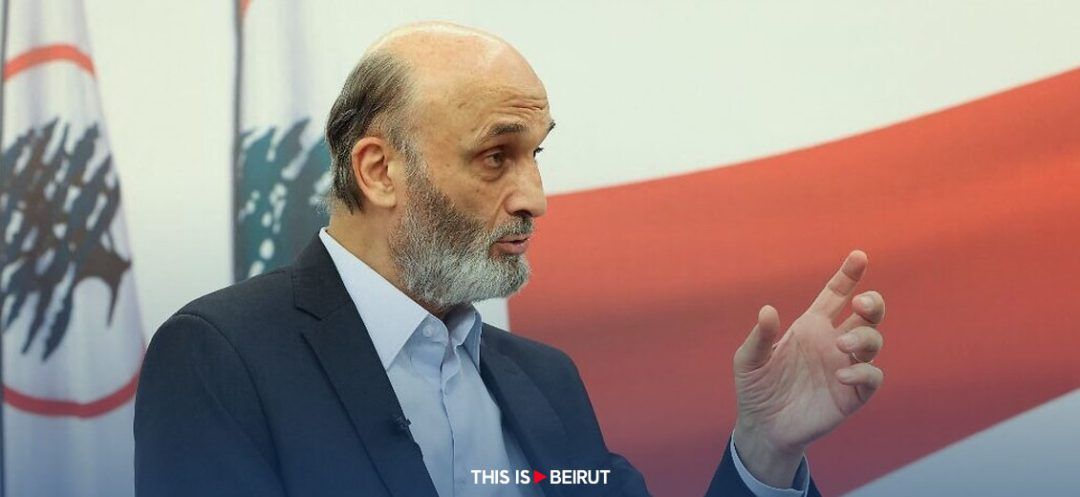
Lebanese Forces (LF) leader Samir Geagea sent a letter to UN Secretary-General António Guterres on Tuesday, taking advantage of the visit of his representative to Lebanon, Jeanine Hennis-Plasschaert, to denounce "the position adopted by the Office of the High Commissioner for Refugees (UNHCR) on the issue of the Syrian presence in Lebanon." A position that does nothing to ease the "dilemma" posed by this presence on Lebanon and its societal, economic and security fabric.
In his letter, Geagea sounded the alarm about "the threats to Lebanese sovereignty and identity" posed by "the massive, unregulated influx of Syrian migrants into Lebanon over the past 13 years," following the outbreak of war in Syria in 2011. As the leader of the Lebanese Forces deplored, this influx "continues to grow," to the point where it now represents "40% to 45%" of the population living in Lebanon.
Geagea Denounces UNHCR Violations
On this issue, Geagea felt that "the position adopted by the UNHCR in Lebanon in managing the Syrian migrant crisis adds to the difficulty of dealing with this dilemma." For him, "UNHCR is taking all measures aimed at integrating Syrians into Lebanese society, without attempting to resettle them in third countries or facilitate their return home, particularly in the security zones which now cover over 90% of Syrian territory." The UN organization, he also denounced, "sometimes goes so far as to hinder this return or to encourage Syrians wishing to return (to Syria) to refrain from doing so."
In his letter, Geagea also highlighted "the fragility of Lebanon's official institutions and the profound crises facing the country, whether at the political level with a presidential vacancy (which has lasted since October 31, 2022), at the economic level with the financial collapse or at the security level due to the war raging on the southern front since October 8, 2023 and the double explosion in the port of Beirut on August 4, 2020."
According to the Lebanese leader, the aforementioned factors "have exacerbated the issue of Syrian migrants, turning it into a dilemma that currently threatens Lebanon with various risks that are about to explode at any moment," he also warned.
Geagea deplored the UNHCR's "refusal to hand over to the official Lebanese authorities the information it has documented on Syrians entering Lebanon, despite a request to do so, which denotes bad faith in relations with the host country and an unjustified desire not to cooperate with it."
Worse still, according to the head of the Lebanese Forces, "UNHCR is refusing even to implement the memorandum of understanding it signed with the Directorate General of General Security on September 9, 2003, and which was ratified by the Lebanese government by decree no. 11262 of October 30, 2003. In this memorandum of understanding, the UNHCR acknowledges that Lebanon is not a country of asylum, but only a country of transit. The UN organization thus undertook to set up clear working mechanisms with the Lebanese authorities to expel refugees or resettle them in third countries," he added.
Geagea also criticized the UNHCR for "granting Syrian refugees asylum cards and housing permits, thus circumventing the exclusive authority of the Lebanese state in this area." He went on to point out that the UNHCR's mission "is limited to assisting people to whom the Lebanese state has granted temporary permits, without having the right to intervene further."
Geagea then urged Guterres to ensure that the protocol agreements concluded between UNHCR and Lebanon were applied by the UN agency.
"All this on pain of pursuing the legal measures available against the UNHCR in Lebanon, which may go as far as requesting the Lebanese national judiciary to close its offices in Beirut and suspend its work in Lebanon," Geagea concluded with a warning.
In his letter, Geagea sounded the alarm about "the threats to Lebanese sovereignty and identity" posed by "the massive, unregulated influx of Syrian migrants into Lebanon over the past 13 years," following the outbreak of war in Syria in 2011. As the leader of the Lebanese Forces deplored, this influx "continues to grow," to the point where it now represents "40% to 45%" of the population living in Lebanon.
Geagea Denounces UNHCR Violations
On this issue, Geagea felt that "the position adopted by the UNHCR in Lebanon in managing the Syrian migrant crisis adds to the difficulty of dealing with this dilemma." For him, "UNHCR is taking all measures aimed at integrating Syrians into Lebanese society, without attempting to resettle them in third countries or facilitate their return home, particularly in the security zones which now cover over 90% of Syrian territory." The UN organization, he also denounced, "sometimes goes so far as to hinder this return or to encourage Syrians wishing to return (to Syria) to refrain from doing so."
In his letter, Geagea also highlighted "the fragility of Lebanon's official institutions and the profound crises facing the country, whether at the political level with a presidential vacancy (which has lasted since October 31, 2022), at the economic level with the financial collapse or at the security level due to the war raging on the southern front since October 8, 2023 and the double explosion in the port of Beirut on August 4, 2020."
According to the Lebanese leader, the aforementioned factors "have exacerbated the issue of Syrian migrants, turning it into a dilemma that currently threatens Lebanon with various risks that are about to explode at any moment," he also warned.
Geagea deplored the UNHCR's "refusal to hand over to the official Lebanese authorities the information it has documented on Syrians entering Lebanon, despite a request to do so, which denotes bad faith in relations with the host country and an unjustified desire not to cooperate with it."
Worse still, according to the head of the Lebanese Forces, "UNHCR is refusing even to implement the memorandum of understanding it signed with the Directorate General of General Security on September 9, 2003, and which was ratified by the Lebanese government by decree no. 11262 of October 30, 2003. In this memorandum of understanding, the UNHCR acknowledges that Lebanon is not a country of asylum, but only a country of transit. The UN organization thus undertook to set up clear working mechanisms with the Lebanese authorities to expel refugees or resettle them in third countries," he added.
Geagea also criticized the UNHCR for "granting Syrian refugees asylum cards and housing permits, thus circumventing the exclusive authority of the Lebanese state in this area." He went on to point out that the UNHCR's mission "is limited to assisting people to whom the Lebanese state has granted temporary permits, without having the right to intervene further."
Geagea then urged Guterres to ensure that the protocol agreements concluded between UNHCR and Lebanon were applied by the UN agency.
"All this on pain of pursuing the legal measures available against the UNHCR in Lebanon, which may go as far as requesting the Lebanese national judiciary to close its offices in Beirut and suspend its work in Lebanon," Geagea concluded with a warning.
Read more




Comments